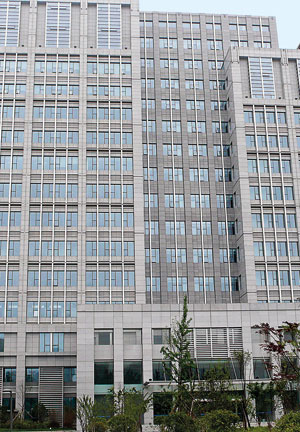Free-cooling proves its potential in telecom hub
Nanjing is an expansive city, reflecting the prosperity and dynamism presently shaping China as a world leader within several industrial sectors. Needless to say, the industrial and commercial boom takes a heavy toll on the telecom networks keeping industries as well as private citizen connected. The present number of inhabitants in Nanjing is exceeding 4 million and the telecom traffic is massive all around the clock. When a 15-storey building designed to function as a hub for the telecom network within the region was erected in 2008, Alfa Laval was selected to supply the equipment and the solutions. Strong local presence, an innovative application of free-cooling and a long-term service agreement paved the way for our company in a purchasing process that was fiercely competitive.
DATE 2023-11-28Strong local presence and a long-term service agreement
 The regional telecom company – Jiangsu Telecom Ltd. – was an Alfa Laval customer already, since our company provided the plate heat exchangers for the building previously serving as a centre for the regional telecom traffic. Still the purchasing process for the new HVAC equipment was indeed competitive, with a couple of major companies entering the race. Efficient after sales service was a crucial factor, since the telecom equipment is both sensitive and very important in all sectors of daily life in the area. Says Magnus Edin, business unit manager (HVAC) at Alfa Laval:
The regional telecom company – Jiangsu Telecom Ltd. – was an Alfa Laval customer already, since our company provided the plate heat exchangers for the building previously serving as a centre for the regional telecom traffic. Still the purchasing process for the new HVAC equipment was indeed competitive, with a couple of major companies entering the race. Efficient after sales service was a crucial factor, since the telecom equipment is both sensitive and very important in all sectors of daily life in the area. Says Magnus Edin, business unit manager (HVAC) at Alfa Laval:
"When it comes to telecom equipment, efficient cooling is crucial to prevent disturbance of operation. Poor cooling performance or breakdowns can disrupt important communication – with dire consequences for subscribers and for the society as a whole. In this case, the demands concerning reliability were indeed rigorous. I am indeed proud that we could take on this challenge successfully."
Obviously, the customer was pleased with the after sales service provided by our company in the past. Also this time we were able to demonstrate that our local distributor could offer excellent service resources dimensioned to meet this challenging task. As part of our undertaking, we signed a long-term service agreement. Magnus Edin again:
"We always consider service an integrated part of our offer. This is logical, since an efficient service pattern is a major reliability factor. In this case, when you consider the vital function of the telecom equipment, this aspect was a crucial one."
The potential of free-cooling
The low weight, the high heath transfer capacity and the compact measures of the Alfa Laval heat exchangers were other crucial parameters for the final selection of our company as HVAC supplier in this case. The floor surface of the Nanjing telecom centre is being exploited to the brim, with five floors jammed with advanced telecom equipment.
The Alfa Laval team was able to demonstrate the energy-saving effects of free-cooling and how this effect can be optimised by selection of our heat exchangers. The building comprises five sets of chillers for cooling all around the year. During a normal winter, free-cooling can be applied at least during 90 days.
As one set of chillers stops operating during these days – its power consumption being 505 kW – the energy-saving potential amounts to: 505 x 24 x 90=1,090 800 kW. The low weight, the high heath transfer capacity and the compact measures of the Alfa Laval heat exchangers were other crucial parameters for the final selection of our company as HVAC supplier.
Free-cooling is gaining ground
Free-cooling is one of the fields where Alfa Laval accumulates valuable experience from all over the world. It can sometimes cut electricity costs with as much as 75 percent, while also reducing the use of harmful refrigerants. The method can be used when the free-cooling source has a lower temperature than the cold water. In applications where chillers can be shut down during three to four months annually, the payback time of a free-cooling system varies between six months and two years.
Most free cooling sources – e.g. water from lakes, oceans or rivers, ground water or ice and snow – are highly aggressive to the equipment. Since the plates in Alfa Laval PHEs can be made from resistant materials, the exposure to aggressive media raises no problems. A PHE made of titanium – the material required when using salt water as a cooling medium – is far less expensive than a titanium shell-and-tubes heat exchanger.
